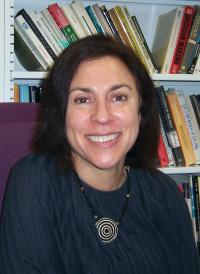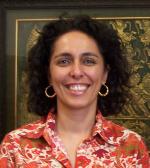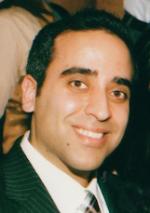From the Silk Road to the Silicon Highway: Collaboration in a Global World
On November 26, 2010, ISR Professor Gloria Mark presented the keynote talk at the Seventh National CCSCW (China Computer-Supported Cooperative Work) Conference, held in Nanjing, China. The talk was entitled “From the Silk Road to the Silicon Highway: Collaboration in a Global World.” With Chinese academics and industry researchers in attendance, Mark spoke on social and technical issues that need to be addressed to support distributed collaboration on a global level.
 Mark’s talk focused on the challenges that researchers in the interdisciplinary field of CSCW face. She began the talk by pointing out that China was a central figure in early global collaboration with the development of The Silk Road, over 2,000 years ago. The Silk Road was actually a collection of routes between the Chinese Imperial capital, Xi’an, and those westwards to the Middle East, Venice, Antioch and Tyre. China of today is very involved in fostering intercultural communication and cooperation with other countries, particularly in academics and commerce. Yet though technical innovations proceed at a rapid pace to connect people globally, there is still a relative lack of understanding in the social aspects of intercultural technology use. As a researcher in the field of human-computer interaction, Mark is interested in understanding how collaborative systems and group behavior interact.
Mark’s talk focused on the challenges that researchers in the interdisciplinary field of CSCW face. She began the talk by pointing out that China was a central figure in early global collaboration with the development of The Silk Road, over 2,000 years ago. The Silk Road was actually a collection of routes between the Chinese Imperial capital, Xi’an, and those westwards to the Middle East, Venice, Antioch and Tyre. China of today is very involved in fostering intercultural communication and cooperation with other countries, particularly in academics and commerce. Yet though technical innovations proceed at a rapid pace to connect people globally, there is still a relative lack of understanding in the social aspects of intercultural technology use. As a researcher in the field of human-computer interaction, Mark is interested in understanding how collaborative systems and group behavior interact.
In her talk, Mark raised the question: What issues do designers and practitioners of computing systems need to take seriously to support successful global collaboration? She explained how distance involves not only a geographical separation among collaborating partners but also cultural, time zone, language, organizational, and contextual differences. These are problems that technology alone cannot  solve. She presented projects that she has worked on over the last eight years that illustrate different ways these differences can be bridged, by using a sociotechnical approach. These projects included supporting scientific team-to-team distributed collaboration, a global conference room with wall-size HDTV video-conferencing, managing multiple distributed collaborations, global telemedicine collaboration, and the use of ubiquitous and mobile technologies in disrupted areas.
solve. She presented projects that she has worked on over the last eight years that illustrate different ways these differences can be bridged, by using a sociotechnical approach. These projects included supporting scientific team-to-team distributed collaboration, a global conference room with wall-size HDTV video-conferencing, managing multiple distributed collaborations, global telemedicine collaboration, and the use of ubiquitous and mobile technologies in disrupted areas.
For example, Mark has been studying how, in areas that have been disrupted by conflict or disaster, people use mobile and Internet technologies to continue their work and social lives. In this project she is collaborating with ISR Project Scientist Ban Al-Ani and Ph.D. student Bryan Semaan. Though people may not be able to travel in the disrupted environment, people have invented new ways to  use technology to travel safely, to continue to work (virtually), and to connect with others globally. “The value of connecting to others globally cannot be understated. It is a means for citizens to be journalists as well as a means for people to create a network of global support,” says Mark.
use technology to travel safely, to continue to work (virtually), and to connect with others globally. “The value of connecting to others globally cannot be understated. It is a means for citizens to be journalists as well as a means for people to create a network of global support,” says Mark.
In another project, Mark is collaborating with ISR post-doctoral researcher Daniel Massaguer on the VirTel Med project, a telemedicine project designed to deliver health care to people in remote regions both domestically and in developing regions. The VirTel Med system leverages the high penetration of mobile phones, whereby using a novel visual mobile phone interface, people can communicate their symptoms to a web-based environment. Health care workers, in turn, from anywhere in the world, can then collaborate and communicate with the patient through this environment.
Currently, Mark is also working on a project with ISR sponsor Northrop Grumman. The goal of this project is to design a technical system to support people who engage in high levels of multitasking as they deal with large amounts of information on the computer. As a first step, Mark produced a primer on theories that relate to human processing of information, ranging from types of memory stores, automatic and controlled processing, divided and selective attention, and priming, to theories that take the environment and social interaction into account such as activity theory, situated action, and distributed cognition. The next phase of the project will be to develop a prototype that is based on one or more of these theories.
Mark has been studying multitasking in the workplace for the last several years. With ICS post-doctoral researcher Stephen Voida, she is currently collaborating on a large-scale field study to examine the role of email in multitasking. Information workers have been suspending their use of email so that the researchers can examine how it affects different aspects of work, ranging from productivity, stress levels, to reconfigurations in people’s social networks.
Mark’s research focuses on studying collaborative technology use and adoption. She has done extensive work in understanding requirements analysis for collaborative technologies and in evaluating technologies in practice. In her past projects, she has participated in system development for novel technologies, and studied distributed collaborations in diverse organizations using a variety of technologies, including a German government ministry, The Boeing Co., NASA, Intel and local software companies.
For more on Mark’s research, see:



